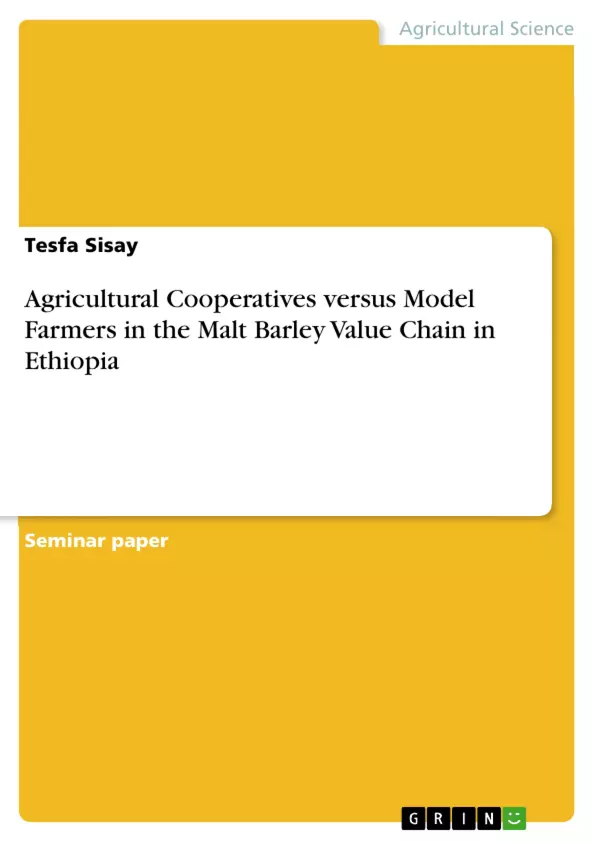This paper provides an overview of agricultural cooperatives versus model farmers in the malting barley value chain in Ethiopia. In Ethiopia, per capita beer consumption increased by 20% annually. Thus, the increase in beer demand invited the emergence of multiple foreign beer factories towards the beer production that opened the door for malt barley contract farming. Malt barley contract farming was firstly introduced by Diageo followed by Heineken beer companies. Along the value chain of malt barley contract farming, agricultural cooperatives and model farmers are known chain actors. While some literature reveals the positive outcome of agricultural cooperatives in other agricultural activities, others verify agricultural cooperatives as the ineffective one.
Inhaltsverzeichnis (Table of Contents)
- 1. INTRODUCTION
- 1.2. Statement of the Problem
- 2. LITERATURE REVIEW
- 2.1. Contract Farming and Drivers for Contract Farming
- 2.2. Drivers for firms
- 2.3. Drivers for Smallholder Farmers
- 2.4. Debates on Contract Farming
- 2.5. The Model Farmers and History of Model farmers in Ethiopia
- 2.6. Agricultural Cooperatives and History of Agricultural Cooperatives in Ethiopia
- 2.7. The essence of Political Economy
- 2.8. The Political Economy of Model Farmers and Agricultural Cooperatives
- 3. THEORETICAL FRAMEWORKS OF MODEL FARMERS AND AGRICULTURAL COOPERATIVES IN MALT BARLEY CONTRACT FARMING
- 4.PERFORMANCES OF MODEL FARMERS VERSUS AGRICULTURAL COOPERATIVES IN MALT BARLEY CONTRACT FARMING
- 4.1. Case studies on effectiveness of Model farmers versus Agricultural Cooperatives Malt Barley contract farming
- 5. CONCLUSION
- 6. REFERENCES
Zielsetzung und Themenschwerpunkte (Objectives and Key Themes)
This doctoral seminar explores the relationship between agricultural cooperatives and model farmers within the malt barley value chain contract farming in Ethiopia. The study aims to analyze the performances of these two actors and investigate the political economy surrounding them. It investigates the drivers, debates, and theoretical frameworks of contract farming in the context of Ethiopia.
- The role of agricultural cooperatives and model farmers in malt barley contract farming
- The effectiveness of model farmers versus agricultural cooperatives in contract farming
- The political economy of model farmers and agricultural cooperatives in Ethiopia
- The influence of political ideologies on the performance of these actors
- The impact of contract farming on smallholder farmers in Ethiopia
Zusammenfassung der Kapitel (Chapter Summaries)
- Chapter 1: Introduction: This chapter introduces the research topic, outlining the problem statement and the context of malt barley contract farming in Ethiopia. It highlights the increasing demand for beer, the emergence of foreign beer factories, and the involvement of cooperatives and model farmers in the value chain.
- Chapter 2: Literature Review: This chapter provides a comprehensive overview of existing literature on contract farming, model farmers, and agricultural cooperatives. It discusses drivers for contract farming, debates surrounding its effectiveness, and the history of model farmers and cooperatives in Ethiopia. It also explores the concept of political economy and its relevance to the study.
- Chapter 3: Theoretical Frameworks: This chapter examines the theoretical frameworks relevant to understanding the performance of model farmers and agricultural cooperatives in malt barley contract farming. It analyzes the factors that contribute to their effectiveness, including social capital, trust, and financial capital.
- Chapter 4: Performances of Model Farmers versus Agricultural Cooperatives: This chapter presents a comparative analysis of the performance of model farmers and agricultural cooperatives in malt barley contract farming. It examines their effectiveness in input distribution, service delivery, and overall agribusiness management.
Schlüsselwörter (Keywords)
The main keywords and focus topics of the text are contract farming, malt barley, agricultural cooperatives, model farmers, political economy, Ethiopia, beer industry, value chain, input distribution, service delivery, and performance.
- Arbeit zitieren
- Tesfa Sisay (Autor:in), 2021, Agricultural Cooperatives versus Model Farmers in the Malt Barley Value Chain in Ethiopia, München, GRIN Verlag, https://www.hausarbeiten.de/document/1162483


